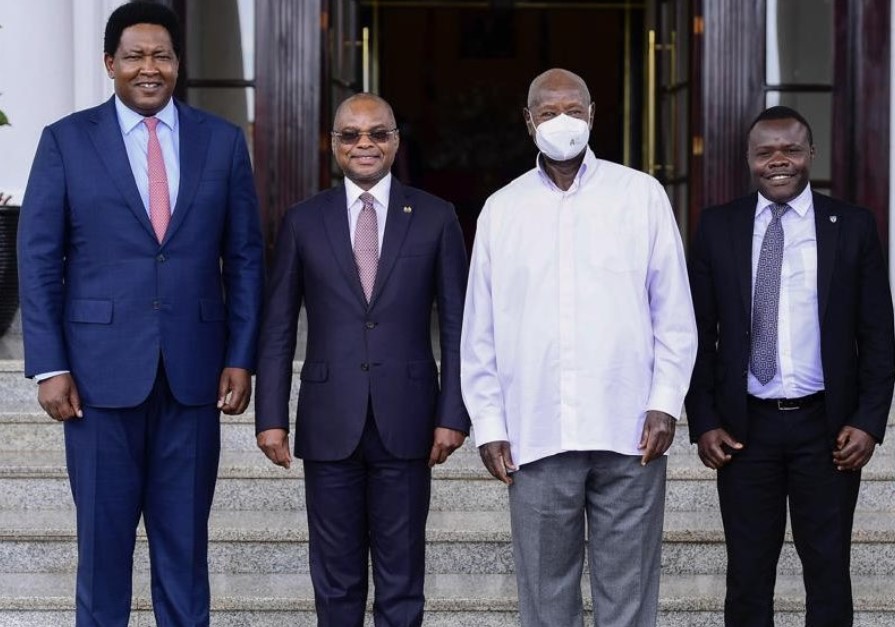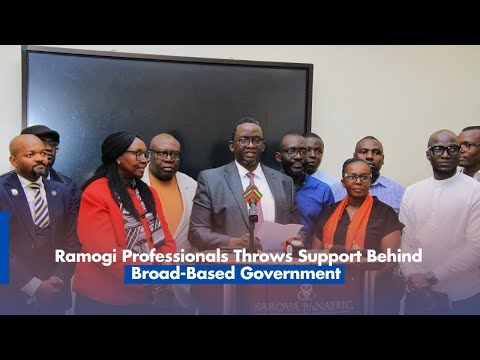
 Senator
Ledama Olekina, Speaker Amason Kingi, President
Yoweri Museveni and Migori
Senator Eddy Oketch at State House
Entebbe where they met to discuss East African Federation / Integration and development of
our East African Economy.
Senator
Ledama Olekina, Speaker Amason Kingi, President
Yoweri Museveni and Migori
Senator Eddy Oketch at State House
Entebbe where they met to discuss East African Federation / Integration and development of
our East African Economy.
This past week, I had the distinct honour of attending the Ateker Cultural Festival 2024 in Uganda.
The event brought together communities from Kenya, Uganda, South Sudan, Ethiopia and Tanzania, all sharing historical and cultural ties.
Our host, President Yoweri Museveni, reminded us that even as we grapple with our historical and cultural baggage, we must look beyond our divisions to harness the true potential of the East African region.
During a one-on-one chat, President Museveni, ever the elder statesman, reminded me of the failed dream of the East African Federation, a vision championed by post-Independence leaders such as Jomo Kenyatta, Julius Nyerere and Milton Obote.
They sought to unify East Africa into a single political and economic bloc, but their ambitions were thwarted by technocrats with narrow, territorial instincts.
Early on in Kenya, General Charles Njonjo saw more value in safeguarding the country’s colonial legacy as the ‘White Highlands’ than in embracing regional unity.
Blind to the broader vision, other technocrats in Uganda and Tanzania also prioritised narrow national concerns, thus stalling regional unity.
One of the most glaring obstacles to regional integration is the lack of seamless movement within East Africa.
A flight from Nairobi to Mombasa takes just 55 minutes and costs around Sh20,000.
A flight to Entebbe, Uganda’s capital, takes the same time, but costs more than Sh103,600.
Why such a discrepancy? This is one example of the commercialised airspace that hinders free movement and trade across the region.
The solution, as Museveni suggested, lies in domesticating our airspace, making travel between East African countries more affordable and efficient.
If we truly believe in the promise of the East African Federation, we must work towards reducing the burdens of taxation, bureaucratic obstacles, and trade tariffs that strangle our economic potential.
The economic possibilities are evident, for example, in agricultural production.
In Uganda, for instance, rice is a major crop but President Museveni has taken the bold step of limiting rice cultivation in wetlands and encouraging his people to look to the highlands and importing from neighbouring Tanzania.
In Kenya, the maize deficit is often filled with imports despite the region’s capacity to meet demand. is approach serves no one in the long term.
Trade should not be seen as a zero-sum game.
Tribalism remains one of the greatest hindrances to national and regional unity.'
In Kenya, for example, we are often too deeply entrenched in our tribal cocoons to see the bigger picture.
Most importantly, we must confront the colonial mentality that still exists in our political systems.
It must be said the borders dividing us were created by colonial powers. ey are lines on a map that only serve as artificial barriers to true unity.
In this modern age, we must be bold enough to imagine a region without borders where citizens can move freely and trade without hindrances.
Leaders from the region must take a page from Museveni’s playbook and unapologetically champion the cause of integration.
This means convening regular summits with clear, actionable goals and holding governments accountable for progress.
East Africa is in dire need of a stabilising force, a ‘centre of gravity’ to anchor the region’s political and economic future.
Just as the United States serves as the backbone of NATO, East Africa must forge a unified bloc capable of responding swiftly and effectively to crises.
Whether it’s the spiralling confl ict in Sudan or rebels destabilising the DRC, a federated East Africa, driven by a renewed spirit of pan-Africanism, could muster the collective strength to act decisively.
In my view, President William Ruto’s recent assumption of the East African Community chairmanship and Raila Odinga’s pursuit of the African Union Commission leadership present a monumental opportunity.
Both leaders can banish their legacies through decisive and measurable progress. East Africa, and the continent at large, don’t need more summits or lofty speeches.
They needs results: true freedom of movement, open trade and a united political vision.
If
we fail to take decisive action now, we
will pass on a fractured continent to
future generations. The moment for
leadership is now.















![[PHOTOS] Ole Ntutu’s son weds in stylish red-themed wedding](/_next/image?url=https%3A%2F%2Fcdn.radioafrica.digital%2Fimage%2F2025%2F11%2Ff0a5154e-67fd-4594-9d5d-6196bf96ed79.jpeg&w=3840&q=100)



